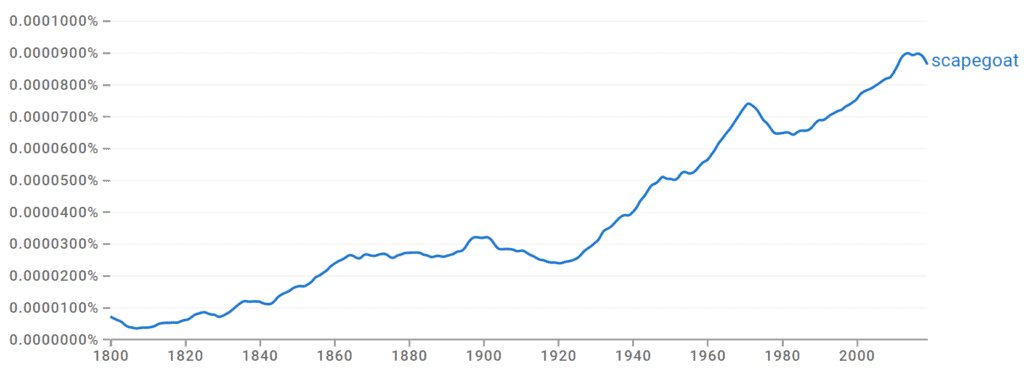“Scapegoat” and “escape goat” are two terms that are often confused because they sound similar and involve the word “goat.” However, they are actually quite distinct and have different meanings and origins. But don’t worry, I go over the meanings behind both terms right here and even provide some good examples of them in sentences.
Scapegoat Etymology

“Scapegoat” is a noun that refers to a person who is blamed or punished for the mistakes or misdeeds of others, even though they may not be responsible.
In modern usage, “scapegoat” is often used to describe someone who is unfairly blamed or punished for the mistakes of others, especially in a group or organization. It can also refer to a person or thing that is used to deflect blame or attention away from the real issues or problems.
Scapegoat Origin

The term comes from the Biblical story of Aaron, who, according to Leviticus, was commanded to take two goats and present them before the Lord. One goat was to be sacrificed as a sin offering, while the other was to be sent into the wilderness, symbolically bearing the sins of the people. This second goat became known as the “scapegoat.”
Scapegoat Sentence Examples
It might help to actually see the word being used in the context of a sentence. Here, I whipped up a few for you to check out.
- The company’s CEO became the scapegoat for the financial crisis, even though many other executives were also responsible.
- The team’s star player was made the scapegoat for the loss, even though the whole team had performed poorly.
- The government used the immigrants as a scapegoat for the country’s economic problems rather than addressing the real causes.
Is There an Escape Goat Definition?
“Escape goat,” on the other hand, is not a real term. Not that I can determine, anyway. All I’m imagining is a crew of people fleeing a scene on the backs of goats, but we all know that’s not right. Is escape goat slang? No, it’s not even proper slang; it’s just not a term at all.
It is a common misspelling or misunderstanding of “scapegoat.” I couldn’t find the phrase “escape goat” in any dictionary or respected sources, and it doesn’t seem to have a widely accepted meaning.

Some people may use “escape goat” to mean a person who is able to escape blame or punishment, but this usage is incorrect and not widely understood.
In order to avoid confusion or misunderstanding, it is important to use the correct term “scapegoat” when referring to someone who is blamed or punished for the mistakes or misdeeds of others. “Escape goat” should be avoided, as it is not a real word and may not be understood by others.
There’s No Scapegoat When It Comes to Good Grammar
So, in the end, “scapegoat” is a term that refers to a person who is unfairly blamed or punished for the mistakes or misdeeds of others, while “escape goat” is a common misspelling or misunderstanding of “scapegoat” and is not a real word. It’s definitely important to use the correct term “scapegoat” in order to avoid people thinking escape goats are real things.
Check out some others we covered:
